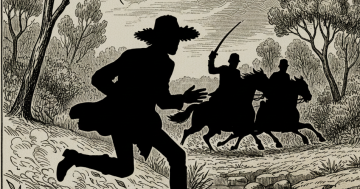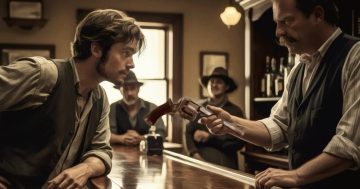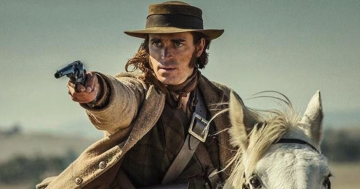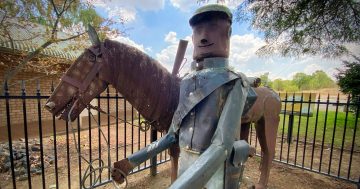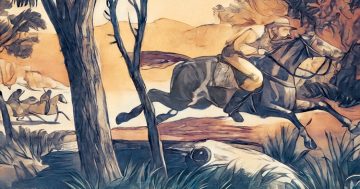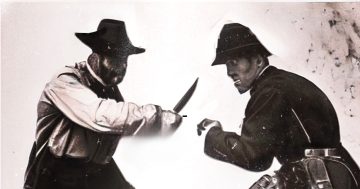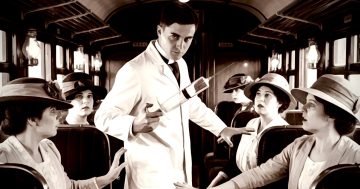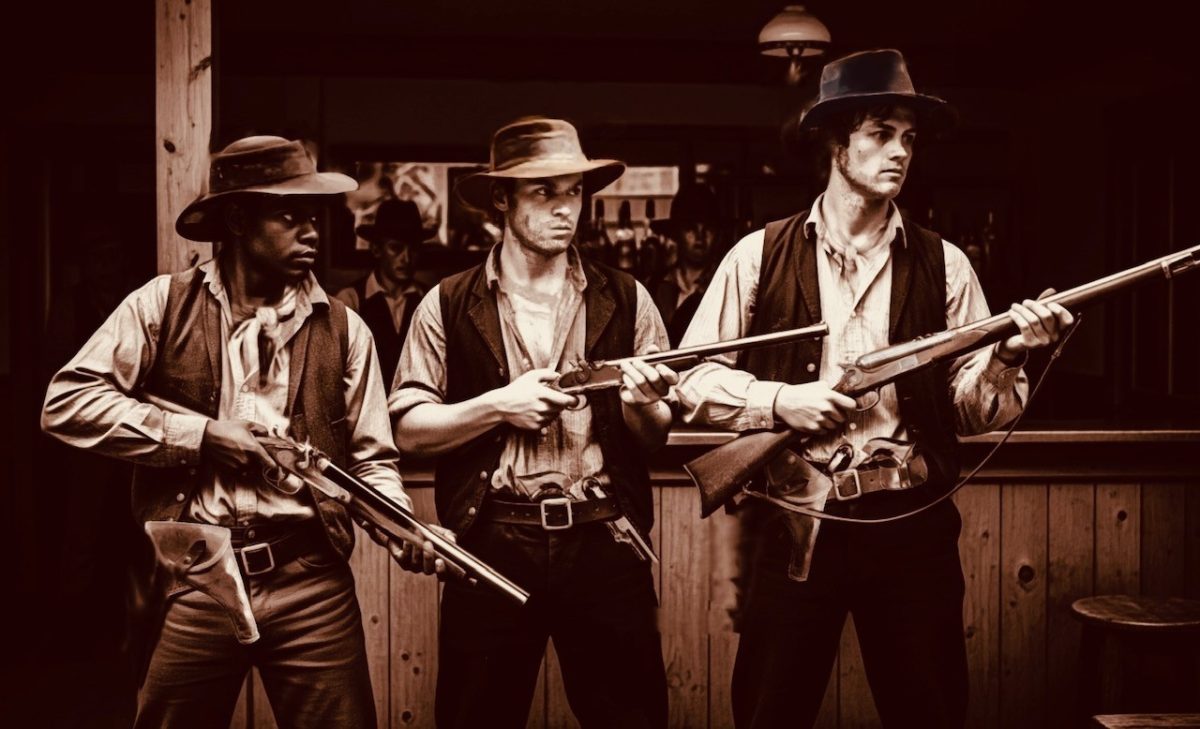
The decision to stock up on booze at the Junee Hotel was the end of the road for three Riverina bushrangers. Photo: Created using AI and Photoshop.
On a Saturday night in late August 1867, three thirsty teenage bushrangers stuck up the Junee Hotel.
Loaded up with rum, ginger wine and champagne, they rode north to a sheep station called Bagdad where they planned to party with local shepherds.
Unfortunately for the thieves, it was a party of police officers who would soon close in to cut short their celebrations.
In 1867 Robert Cottrell, aka ‘Bluecap’, was one of the Riverina’s most colourful and prolific local bushrangers. His unusual nickname came from the opaque visor he wore to shield his inflamed eyes from the sun and he and his confederates robbed their way across southern NSW for about five months.
Their crime spree began in the Autumn of 1867 and was falling apart by spring as the gang had a reputation for boozing on the job and occasionally brawling with each other.
In August, the gang had celebrated after a spectacular gunfight on horseback at Bolaro Station and had fallen out.
Eighteen-year-old John Irvine Scott (AKA ‘Jack the Devil’) was born in Tarcutta and along with fellow teenager James Smith, had parted ways with Cottrell and his lieutenant John ‘the White Chief’ Williams.
Joined by an Aboriginal recruit named Black Jack, the trio held up Mimosa Station at Merool Creek before moving on to Sebastopol and settling into a shepherd’s hut on Bagdad station.
The decision to make a booze run to Junee would be their undoing.
Three constables from the Cootmundry Police were camped nearby and as soon as word reached them of the robbery at the Junee Hotel, they set off in pursuit.
Arriving at Bagdad station just after nightfall, the three officers dismounted and once it was quiet, crept cautiously up to the hut.
Finding three horses tethered outside, they led them away and settled in behind some bushes to watch the hut until morning.
A report from the Wagga Wagga Express contains a first-hand account from Senior Constable Usher, including some uncomfortable references to the Indigenous member of the gang.
“We had been watching the hut during the night, and when near daylight we went to arrest the prisoners, I saw the prisoner Scott come out to the front of the hut. I called upon him in the Queen’s name to surrender,” he recalled.
Inside the hut, the trio scrambled for weapons and Jack the Devil took a position by the door with a fast-loading Dreyse needle-gun and prepared to shoot it out.
The police opened fire and blasted two holes through the hut’s thin walls, almost hitting a sleeping shepherd, and young Jack rethought his position and abandoned the rifle.
“He came out to the front of the hut; I called upon him to lay down his arms and surrender,” Senior Constable Usher continued.
“He said, ‘I have got no firearms’. I then ordered him to walk towards us. He did so. I ran towards him, and told the constables to look after this man until I should see after the others.”
As Constable Whyte took charge of Jack the Devil, Constable Little called out, “Look at the two men running away into the bush”.
Little and Usher gave chase on foot, calling on the pair to stop and surrender. When they failed to do so, Usher paused and fired his rifle at Smith who stopped and turned.
“I called upon him to throw down his arms and surrender. After some hesitation he did so, throwing a revolver to the ground,” Usher said.
With Smith in custody, Usher continued on after Black Jack, closing to within 60 metres and calling on him to surrender like his mate.
“He turned round, raised his arm, and levelled his revolver at me,” Usher said.
“At the same time I took a deliberate aim at him with my revolver and fired, but missed him.
“I told him I would fire again if he did not lay down his arms. He did so, and came towards me.”
When police searched the hut they discovered an “immense quantity” of ammunition and so many guns that it required two police officers to lift the haul.
On Monday 28 October 1967, the three forlorn youths fronted the Wagga Wagga Circuit Court where Scott and Smith pled guilty to three charges of robbery under arms and Black Jack to one charge.
A reporter from the Burrangong Argus described them as a trio of disappointingly “weedy scrubbers” with little regard for their fate.
“Simple bush-tutored lads, whom the wheel of circumstances would as readily turn to the path of virtue as to vice.”
After a stern lecture from the judge, all three youths were sentenced to 10 years hard labour.
Bluecap and The White Chief remained at large for another month before joining their former confederates behind bars.







